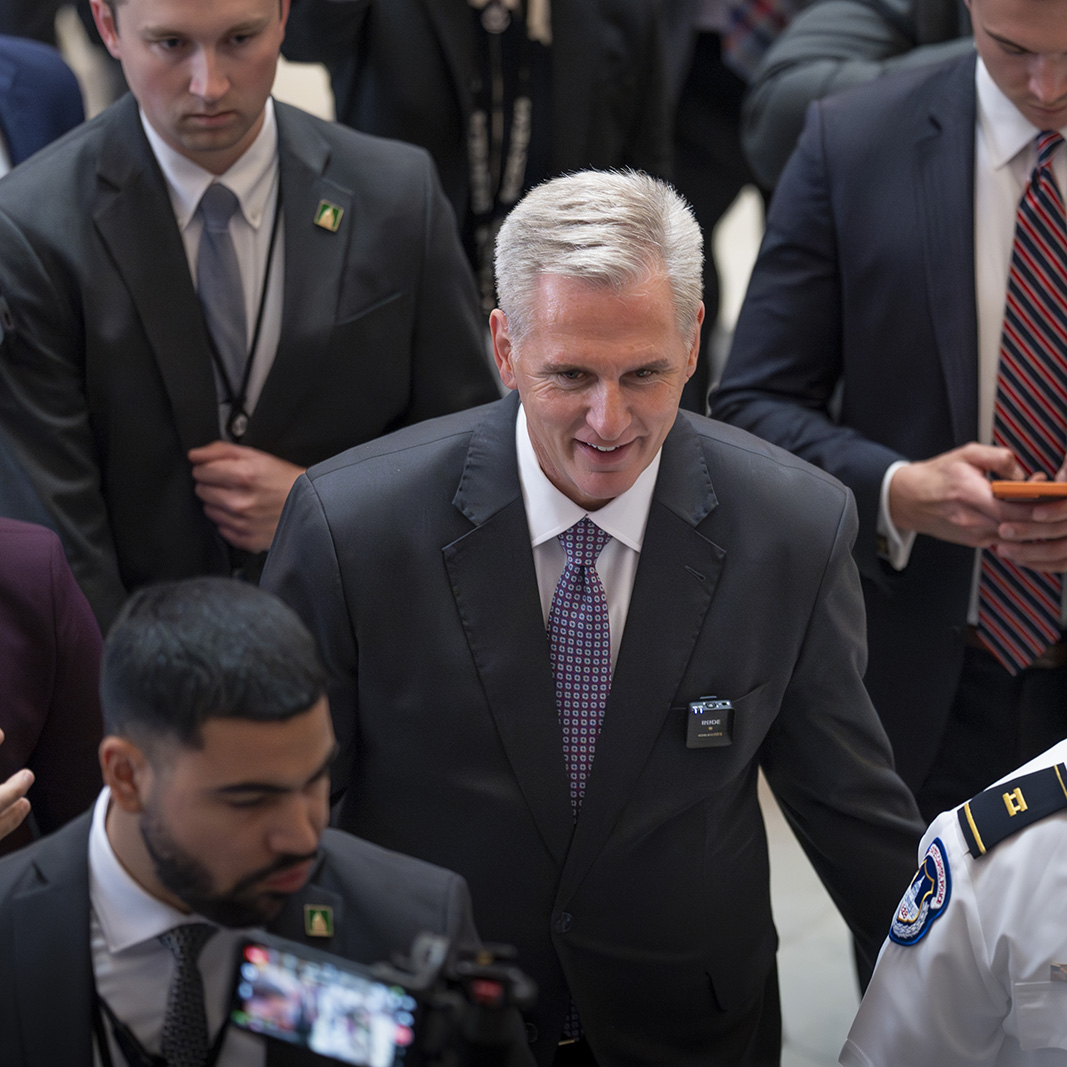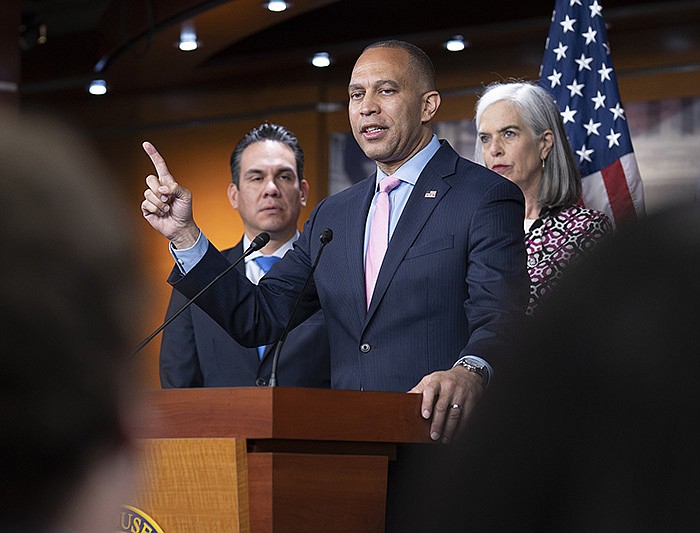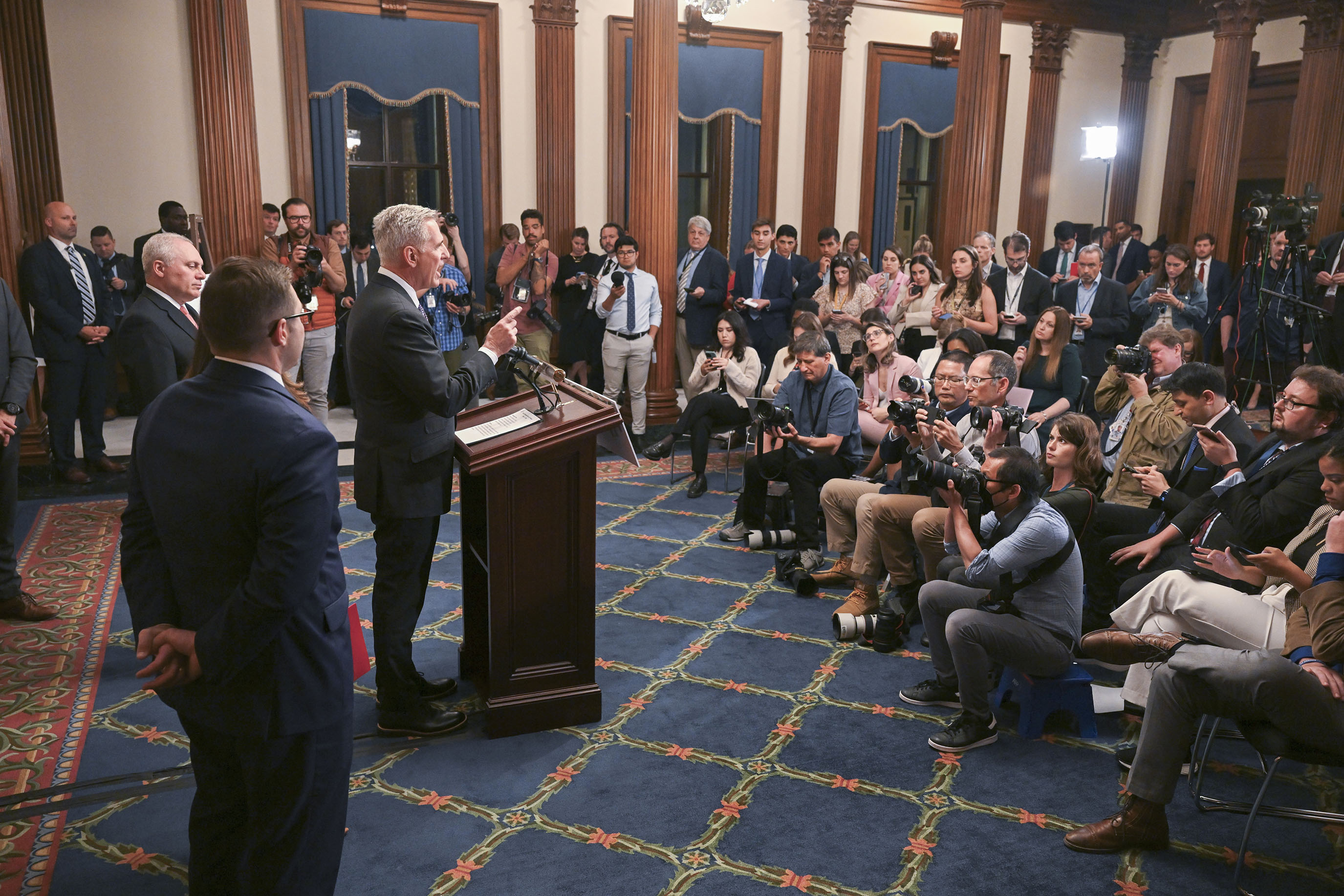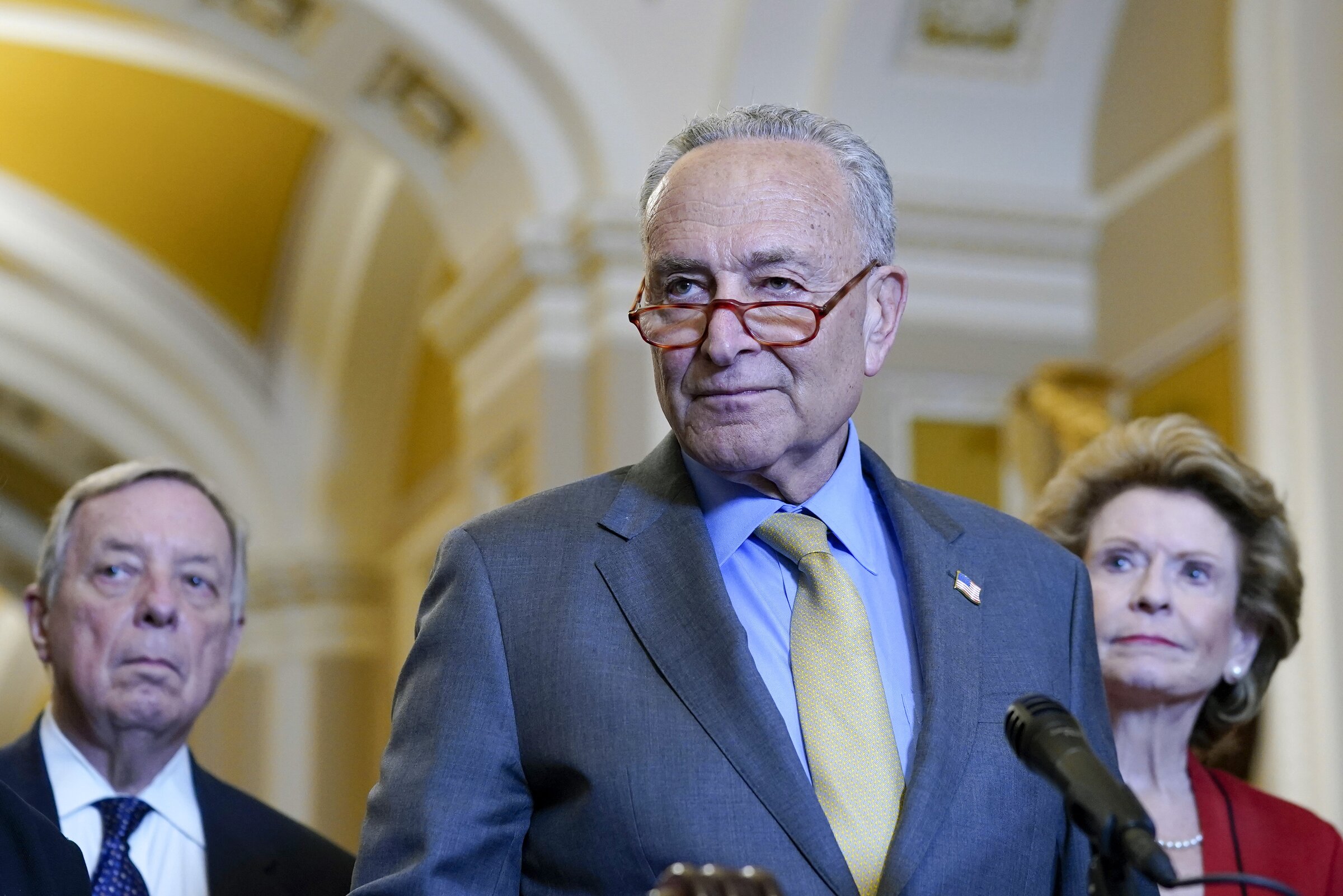WASHINGTON -- The House approved a debt ceiling and budget cuts package late Wednesday, as President Joe Biden and Speaker Kevin McCarthy assembled a bipartisan coalition of centrist Democrats and Republicans against fierce conservative blowback and progressive dissent.
The hard-fought deal pleased few, but lawmakers assessed it was better than the alternative -- a devastating economic upheaval if Congress failed to act. Tensions ran high throughout the day as hard-right Republicans refused the deal, while Democrats said "extremist" GOP views were risking a debt default as soon as next week.
With both far-right and hard-left lawmakers in revolt over the deal, it fell to a bipartisan coalition powered by Democrats to push the bill over the finish line, throwing their support behind the compromise in an effort to break the fiscal stalemate. On the final vote, 149 Republicans and 165 Democrats backed the measure, while 71 Republicans and 46 Democrats opposed it.
With the House vote of 314-117, the bill now heads to the Senate, with passage expected by week's end.
The measure nearly collapsed on its way to the House floor, when hard-right Republicans sought to block its consideration, and in a suspenseful scene, Democrats waited several minutes before swooping in to supply their votes for a procedural measure that allowed the plan to move ahead.
The deal would suspend the $31.4 trillion borrowing limit until January 2025. It would cut federal spending by $1.5 trillion over a decade, according to the Congressional Budget Office, by effectively freezing some funding that had been projected to increase next year and then limiting spending to 1% growth in 2025, which is considered a cut because it would be at a lower level than inflation. The legislation would also impose stricter work requirements for food stamps; claw back some funding for IRS enforcement and unspent coronavirus relief money; speed the permitting of new energy projects; and officially end Biden's student loan repayment freeze.
The compromise was structured with the aim of enticing votes from both parties. It allowed Republicans, who refused to raise the debt ceiling and avert a default without conditions, to say that they succeeded in reducing some federal spending -- even as funding for the military and veterans' programs would continue to grow -- while allowing Democrats to say that they spared most domestic programs from the severe cuts.
McCarthy framed the bill Wednesday as a "small step putting us on the right track" and urged his members to support it.
"We're finally bending the curve on discretionary spending because of this bill, and we're doing it while at the same time raising our national defense, and our veterans fully funded, with Social Security and Medicare preserved," McCarthy said in a speech on the House floor, adding, "That is a major victory."
Rep. Hakeem Jeffries, D-N.Y., the minority leader, described the deal as a vital step and thanked Democrats for their "efforts to make sure that we push back the extreme MAGA Republican efforts to jam right-wing cuts down the throats of the American people."
"From the very beginning, House Democrats were clear that we would not allow extreme MAGA Republicans to default on our debt, crash the economy or trigger a job-killing recession," Jeffries said. "Under the leadership of President Joe Biden, Democrats kept our promise."
SELLING THE DEAL
McCarthy insisted his party was working to "give America hope" as he launched into a late evening speech extolling the bill's budget cuts, which he said were needed to curb Washington's "runaway spending."
But amid discontent from Republicans who said the spending restrictions did not go far enough, McCarthy said it is only a "first step."
Biden sent top White House officials to the Capitol to shore up backing. McCarthy worked to sell skeptical fellow Republicans, even fending off challenges to his leadership, in the rush to avert a potentially disastrous U.S. default.
Swift action later in the week by the Senate would ensure government checks will continue to go out to Social Security recipients, veterans and others and would prevent financial upheaval at home and abroad. Monday is when the Treasury has said the U.S. would run short of money to pay its debts.
Biden and McCarthy were counting on support from the political center, a rarity in divided Washington, testing the leadership of the Democratic president and the Republican speaker.
Overall, the 99-page bill restricts spending for the next two years, suspends the debt ceiling into January 2025 and changes some policies, including imposing new work requirements for older Americans receiving food aid and green-lighting an Appalachian natural gas line that many Democrats oppose. It bolsters funds for defense and veterans.
Raising the nation's debt limit ensures Treasury can borrow to pay already incurred U.S. debts.
Top GOP deal negotiator Rep. Garret Graves of Louisiana said Republicans were fighting for budget cuts after Democrats piled onto deficits with extra spending, first during the covid-19 crisis and later with Biden's Inflation Reduction Act, with its investment to fight climate change.
But Republican Rep. Chip Roy of Texas, a member of the Freedom Caucus helping to lead the opposition, said, "My beef is that you cut a deal that shouldn't have been cut."
For weeks negotiators labored late into the night to strike the deal with the White House, and for days McCarthy has worked to build support among skeptics. At one point, aides wheeled in pizza at the Capitol the night before the vote as he walked Republicans through the details, fielded questions and encouraged them not to lose sight of the bill's budget savings.
LOOMING DEADLINE
In the Senate, both Democratic and Republican leaders said they would swiftly take up the legislation and push to get the package to Biden as quickly as possible, with Sen. Charles Schumer, D-N.Y., the majority leader, warning that lawmakers would need to approve the bill without changes to meet the Monday deadline when Treasury Secretary Janet Yellen has said the government would default without action by Congress.
"I cannot stress enough that we have no margin for error," Schumer said. "Either we proceed quickly and send this bipartisan agreement to the president's desk, or the federal government will default for the first time ever."
The vote Wednesday was a major victory for McCarthy, R-Calif., who faced a vast challenge in shepherding a debt ceiling increase through a narrowly divided chamber populated by Republicans who have long refused to raise the borrowing limit. Few had expected that McCarthy would be able to unite his fractious conference around any such measure, much less one negotiated with Biden, without prompting an attempt by his right flank to oust him.
Rep. Dan Bishop, R-N.C., a member of the ultra-conservative House Freedom Caucus, has publicly said that he considered the debt and spending deal grounds for removing McCarthy from his post. Another member of the group, Rep. Ken Buck, R-Colo., told CNN that its members would have "discussions about whether" to try to oust him.
"I'm not suggesting the votes are there to remove the speaker, but the speaker promised that we would operate at 2022 appropriations levels when he got the support to be speaker," Buck said. "He's now changed that to 2023 levels plus 1%. That's a major change for a lot of people."
Under the rules House Republicans adopted at the beginning of the year that helped McCarthy become speaker, any single lawmaker could call for a snap vote to depose him, a move that would require a majority of the House.
As of Wednesday, no such effort had materialized, although there still may be political consequences ahead for McCarthy.
Biden spoke directly to lawmakers, making calls from the White House.
'HOSTAGE SITUATION'
Jeffries said it was up to McCarthy to turn out at least 150 Republican votes, two-thirds of the majority, even as he assured reporters that Democrats would supply the rest to prevent a default. In the 435-member House, 218 votes are needed for approval.
As the tally faltered in the afternoon procedural vote, Jeffries stood silently and raised his green voting card, signaling that the Democrats would fill in the gap to ensure passage. They did, advancing the bill that 29 hard-right Republicans, many from the Freedom Caucus, refused to back.
"Once again, House Democrats to the rescue to avoid a dangerous default," said Jeffries, D-N.Y.
"What does that say about this extreme MAGA Republican majority?" he said about the party aligned with Donald Trump's "Make America Great Again" political movement.
The nonpartisan Congressional Budget Office said the spending restrictions in the package would reduce deficits by $1.5 trillion over the decade, a top goal for the Republicans trying to curb the debt load.
In a surprise that complicated Republicans' support, however, the Congressional Budget Office said their drive to impose work requirements on older Americans receiving food stamps would end up boosting spending by $2.1 billion over the time period. That's because the final deal exempts veterans and homeless people, expanding the food stamp rolls by 78,000 people monthly, the office said.
Progressive Democrats bristled at the bill, and some said they could not support new work requirements for safety net programs or reward Republicans' use of the debt ceiling as a political cudgel.
"Republicans need to own this vote," said Rep. Alexandria Ocasio-Cortez, D-N.Y., who took particular aim at changes to the Supplemental Nutrition Assistance Program and a measure to expedite production of a gas pipeline. "This was their deal. This was their negotiations. They're the ones trying to come in and cut SNAP, cut environmental protections, trying to ram through an oil pipeline through a community that does not want it."
"This has been a hostage situation," said Rep. Greg Casar, D-Texas. "We're going to get out of the hostage situation. I appreciate the president negotiating down the ransom payment for the hostage. But I think it's appropriate for progressives to say we never want to be in this situation again."
Some Democrats were also incensed that the White House negotiated into the deal changes to the landmark National Environmental Policy Act and approval of the controversial Mountain Valley Pipeline natural gas project. The energy development is important to Sen. Joe Manchin, D-W.Va., but many others oppose it as unhelpful in fighting climate change.
Senators, who have remained largely on the sidelines during much of the negotiations, are insisting on amendments to reshape the package. But making any changes at this stage seemed unlikely with so little time to spare before Monday's deadline.
Information for this article was contributed by Lisa Mascaro, Kevin Freking, Stephen Groves, Farnoush Amiri, Zeke Miller, Mary Clare Jalonick and Seung Min Kim of The Associated Press and Catie Edmondson of The New York Times.
 House Speaker Kevin McCarthy leaves the House chamber on Wednesday after a crucial procedural vote on the debt ceiling and budget cuts package. After final approval later in the evening, McCarthy said the Republican Party was working to “give America hope” despite some discontent over the extent of spending cuts. (AP/J. Scott Applewhite)
House Speaker Kevin McCarthy leaves the House chamber on Wednesday after a crucial procedural vote on the debt ceiling and budget cuts package. After final approval later in the evening, McCarthy said the Republican Party was working to “give America hope” despite some discontent over the extent of spending cuts. (AP/J. Scott Applewhite)


